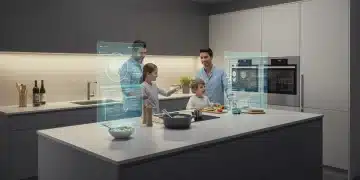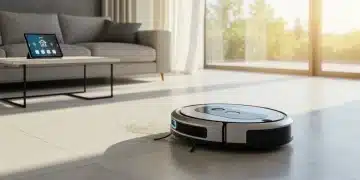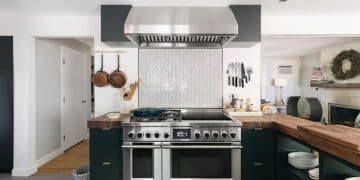Smart Kitchen Trends: Are Automated Cooking Appliances the Next Big Thing?
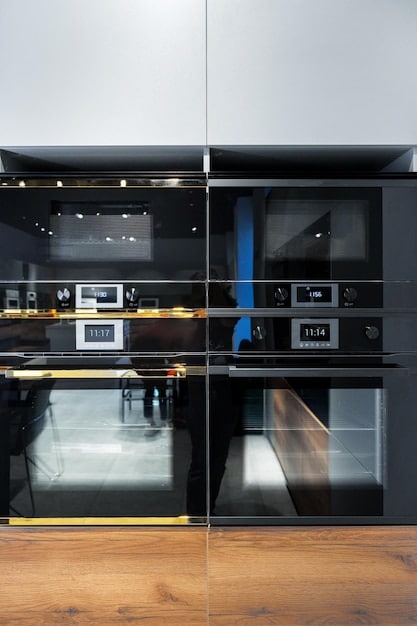
Smart kitchen trends are rapidly evolving, with automated cooking appliances poised to revolutionize home cooking. From intelligent ovens to robotic sous chefs, these innovations promise to simplify meal preparation, enhance culinary precision, and transform the overall cooking experience for home chefs.
Are you ready to step into the future of cooking? Smart kitchen trends are transforming how we approach meal preparation, and automated cooking appliances are leading the charge. Imagine a kitchen where technology anticipates your needs, simplifies complex recipes, and delivers perfectly cooked meals every time.
Smart Appliances: Redefining the Home Chef Experience
The realm of smart appliances extends far beyond simple gadgets; it embodies a paradigm shift in how we interact with our kitchens. Integrating technology into cooking transforms mundane tasks into streamlined, efficient processes. This evolution caters to the needs of modern home chefs seeking convenience and precision.
From ovens that automatically adjust temperature and cooking time to refrigerators that track inventory and suggest recipes, smart appliances are designed to simplify every aspect of meal preparation. These innovations not only save time but also enhance the overall cooking experience.
Key Innovations in Smart Cooking
Several groundbreaking innovations define the landscape of smart cooking. These technologies are not just about automation; they’re about enhancing the chef’s capabilities and providing a more enjoyable culinary journey.
- Intelligent Ovens: These ovens use sensors and AI to detect the type and size of food, automatically adjusting cooking parameters for optimal results.
- Robotic Sous Chefs: Automated arms and appendages that can stir, chop, and perform other repetitive tasks, freeing up the home chef to focus on more creative aspects of cooking.
- Smart Refrigerators: Equipped with cameras and inventory tracking systems, these refrigerators can alert you when supplies are low and even suggest recipes based on available ingredients.
- Precision Cookers: Devices that maintain precise water temperatures for sous vide cooking, ensuring consistent and professional-quality results.
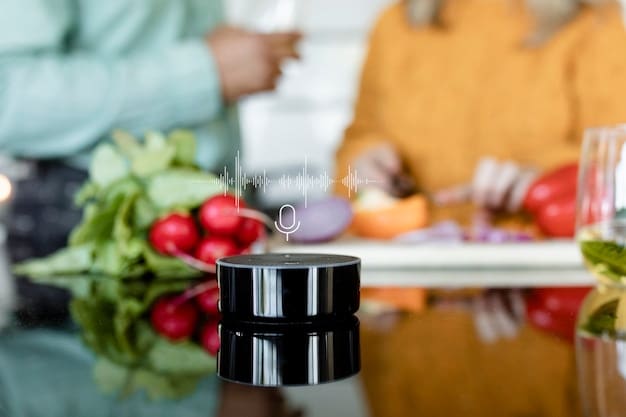
Smart appliances are not just about convenience; they’re about empowering home chefs to achieve culinary excellence with ease. By automating repetitive tasks and providing intelligent assistance, these technologies are redefining the home cooking experience.
Benefits of Automated Cooking Appliances
The allure of automated cooking appliances lies in their multifaceted benefits, which extend beyond mere convenience. These appliances offer a range of advantages that cater to both novice and experienced home chefs, enhancing efficiency, precision, and culinary creativity.
By embracing automation, home cooks can unlock new possibilities and elevate their cooking skills. The benefits are tangible and transformative, impacting not only the cooking process but also the overall quality of meals.
Time Savings and Efficiency
One of the most significant advantages of automated cooking appliances is the substantial time savings they offer. These devices streamline the meal preparation process, allowing home chefs to focus on other tasks while ensuring perfectly cooked meals.
Automated stirring, precise temperature control, and self-adjusting cooking times all contribute to a more efficient kitchen workflow. This efficiency is particularly beneficial for busy individuals and families seeking to enjoy home-cooked meals without spending hours in the kitchen.
Enhanced Culinary Precision
Precision is paramount in cooking, and automated appliances excel in delivering consistent and accurate results. Intelligent ovens, precision cookers, and robotic sous chefs ensure that every dish is cooked to perfection, eliminating guesswork and minimizing errors.
This level of precision not only elevates the quality of meals but also inspires confidence in home chefs, encouraging them to experiment with new recipes and techniques. The ability to consistently achieve desired outcomes fosters a more enjoyable and rewarding cooking experience.
Automated cooking appliances offer a multitude of benefits, from time savings and enhanced precision to increased culinary creativity. These advantages make them an invaluable addition to any modern kitchen, transforming the way we approach meal preparation and cooking.
Challenges and Considerations
While the allure of automated cooking appliances is undeniable, it is essential to acknowledge the challenges and considerations that accompany their adoption. Understanding these factors is crucial for making informed decisions and maximizing the benefits of these technologies.
From initial costs and learning curves to maintenance and data privacy concerns, there are several aspects to consider before fully embracing automated cooking. A comprehensive evaluation ensures that these appliances align with individual needs and preferences.
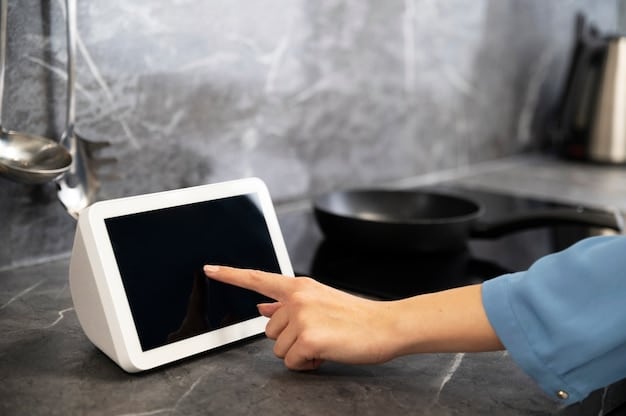
Initial Investment and Cost
One of the primary barriers to entry for many consumers is the initial investment required to acquire automated cooking appliances. These devices often come with a higher price tag compared to traditional kitchen tools, making them a significant financial commitment.
However, it is important to consider the long-term value and potential return on investment. The time savings, increased efficiency, and enhanced culinary results can justify the initial cost for those who frequently cook at home.
Learning Curve and User Adoption
Automated cooking appliances often come with a learning curve, requiring users to familiarize themselves with new interfaces, settings, and functionalities. This can be a daunting task for those who are less tech-savvy or accustomed to traditional cooking methods.
However, most manufacturers provide comprehensive user manuals, tutorials, and customer support to assist users in navigating these technologies. With patience and persistence, most home chefs can overcome the learning curve and fully embrace the benefits of automated cooking.
Data Privacy and Security
As with any connected device, automated cooking appliances raise concerns about data privacy and security. Smart refrigerators, ovens, and other appliances collect data on usage patterns, food preferences, and cooking habits, which could potentially be vulnerable to cyberattacks or misuse.
It is crucial to choose reputable brands that prioritize data security and implement robust encryption and privacy protocols. Users should also take proactive steps to protect their data, such as regularly updating software, changing default passwords, and reviewing privacy settings.
Despite these challenges, the benefits of automated cooking appliances often outweigh the drawbacks. By carefully considering these factors and addressing potential concerns, home chefs can make informed decisions and seamlessly integrate these technologies into their kitchens.
The Role of AI in Smart Kitchens
Artificial intelligence (AI) is the linchpin of the smart kitchen revolution, infusing automated cooking appliances with intelligence, adaptability, and predictive capabilities. AI algorithms analyze data, learn from user behavior, and optimize cooking processes to deliver personalized and efficient culinary experiences.
From intelligent recipe suggestions to automated temperature adjustments, AI enhances every aspect of smart kitchen functionality. It transforms appliances from mere tools into proactive assistants, anticipating needs and delivering tailored solutions.
AI-Powered Recipe Recommendations
One of the most compelling applications of AI in smart kitchens is its ability to generate personalized recipe recommendations based on user preferences, dietary restrictions, and available ingredients. AI algorithms analyze vast databases of recipes, factoring in individual tastes and nutritional needs to suggest dishes that are both appealing and healthy.
This capability simplifies meal planning, eliminates the guesswork of choosing recipes, and encourages culinary experimentation. Home chefs can discover new flavors and cuisines, expanding their culinary horizons with the help of AI-powered suggestions.
Automated Temperature and Time Adjustments
AI algorithms also play a crucial role in optimizing cooking parameters, automatically adjusting temperature and time settings based on the type and quantity of food being prepared. Intelligent ovens, cooktops, and sous vide machines use sensors and machine learning to monitor cooking progress and make real-time adjustments to ensure optimal results.
This level of automation eliminates the need for manual adjustments, reducing the risk of overcooking or undercooking. Home chefs can confidently cook complex dishes, knowing that AI is constantly monitoring and optimizing the process.
AI is the driving force behind the smart kitchen revolution, empowering appliances with intelligence, personalization, and predictive capabilities. As AI technology continues to evolve, we can expect even more sophisticated and intuitive culinary experiences in the years to come.
Future Trends in Automated Cooking
The trajectory of automated cooking is one of continuous innovation, with emerging trends poised to redefine the culinary landscape. From personalized nutrition to seamless integration with smart home ecosystems, the future of smart kitchens promises to be even more exciting and transformative.
These trends reflect a growing demand for convenience, personalization, and sustainability in the kitchen. As technology advances, we can expect automated cooking appliances to become more intuitive, efficient, and environmentally friendly.
Personalized Nutrition and Meal Planning
One of the most promising trends in automated cooking is the integration of personalized nutrition and meal planning. Smart appliances will analyze individual dietary needs, health goals, and preferences to generate customized meal plans and recipes.
AI algorithms will consider factors such as allergies, intolerances, and nutritional deficiencies to create balanced and healthy meals. This level of personalization will empower individuals to take control of their health and wellness through informed food choices.
Seamless Integration with Smart Home Ecosystems
Automated cooking appliances will become seamlessly integrated with broader smart home ecosystems, enabling voice control, remote monitoring, and automated task management. Home chefs will be able to control their ovens, refrigerators, and cooktops using voice commands or smartphone apps.
Smart home integration will also facilitate automated grocery ordering, inventory management, and recipe sharing. The kitchen will become a fully connected and intelligent space, adapting to the needs and preferences of its users.
Sustainability and Waste Reduction
Sustainability is a growing concern in the culinary world, and automated cooking appliances are playing an increasingly important role in reducing waste and promoting environmentally friendly practices. Smart refrigerators can track food expiration dates, suggest recipes based on available ingredients, and minimize food spoilage.
Intelligent ovens and cooktops can optimize energy consumption, reducing electricity and gas usage. These innovations contribute to a more sustainable and responsible approach to cooking.
The future of automated cooking is bright, with trends pointing towards personalized nutrition, seamless smart home integration, and enhanced sustainability. As technology continues to advance, we can expect smart kitchens to become even more efficient, convenient, and environmentally conscious.
Making the Smart Kitchen Transition
Embarking on the journey to transform your kitchen into a smart, automated culinary hub requires strategic planning and informed decisions. Selecting the right appliances, understanding integration options, and adapting to new workflows are essential steps in making a seamless transition.
This transition is not just about acquiring new gadgets; it’s about embracing a new way of cooking that prioritizes convenience, efficiency, and culinary excellence. With careful planning and a willingness to adapt, home chefs can unlock the full potential of automated cooking.
Assess Your Needs and Priorities
Before investing in automated cooking appliances, it is crucial to assess your individual needs and priorities. Consider your cooking habits, dietary preferences, and available kitchen space. Identify the appliances that would provide the greatest benefit and align with your culinary goals.
Prioritize appliances that address your specific challenges and enhance your cooking experience. Whether it’s time savings, precision cooking, or personalized nutrition, focus on selecting appliances that deliver tangible results.
Start Small and Gradually Expand
Transforming your entire kitchen into a smart, automated space can be overwhelming. It is often best to start small and gradually expand, adding new appliances and functionalities as you become more comfortable with the technology.
Begin with one or two key appliances, such as an intelligent oven or a smart refrigerator, and gradually integrate additional devices as your needs evolve. This approach allows you to learn at your own pace and avoid feeling overwhelmed by the complexity of the system.
Embrace the Learning Curve
Automated cooking appliances often come with a learning curve, requiring users to familiarize themselves with new interfaces, settings, and functionalities. Embrace this learning curve as an opportunity to expand your culinary skills and knowledge.
Take advantage of user manuals, online tutorials, and customer support resources to learn how to use your appliances effectively. Experiment with different settings and recipes to discover the full potential of your smart kitchen.
Transitioning to a smart kitchen is a journey that requires planning, adaptation, and a willingness to embrace new technologies. By carefully assessing your needs, starting small, and embracing the learning curve, you can unlock the full potential of automated cooking and transform your culinary experience.
| Key Point | Brief Description |
|---|---|
| 🍳Time Savings | Automated appliances reduce prep & cooking time. |
| 🤖 Culinary Precision | AI ensures consistent, perfect cooking results. |
| 💡 AI Integration | Personalized recipes & automated adjustments enhance cooking. |
| 🌱 Sustainability | Reduces food waste and optimizes energy consumption. |
FAQ
▼
Smart kitchen appliances offer numerous benefits, including time savings, enhanced culinary precision, and personalized recipe recommendations. They also contribute to sustainability by reducing food waste and optimizing energy consumption.
▼
The worth of smart kitchen appliances depends on individual needs and priorities. If you value convenience, precision, and efficiency in cooking, and are willing to invest in advanced technology, they can be a worthwhile addition to your home.
▼
AI-powered appliances enhance cooking by providing personalized recipe suggestions, automating temperature and time adjustments, and optimizing energy consumption. They learn from user behavior to deliver tailored and efficient cooking experiences.
▼
Challenges include the initial investment cost, the learning curve associated with new interfaces and functionalities, and concerns about data privacy and security. However, these challenges can be mitigated with careful planning and informed decision-making.
▼
To ensure data privacy, choose reputable brands with robust security protocols, regularly update software, change default passwords, and review privacy settings on your smart appliances. Implement proactive measures to protect your data from potential cyber threats.
Conclusion
In conclusion, the rise of smart kitchen trends, particularly automated cooking appliances, signals a significant shift in how we approach culinary tasks at home. These innovations offer a compelling blend of convenience, precision, and efficiency, paving the way for a future where technology seamlessly integrates into our cooking routines, enhancing both the process and the results.
